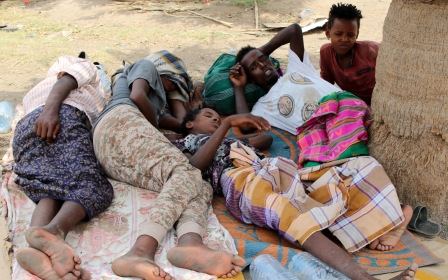Saudi Arabia: How a failed pilgrimage to Mecca led to months of servitude for one Indian woman

It was supposed to be the journey of a lifetime.
Farhana Begum left her home in the Indian city of Hyderabad with the hope of performing Umrah, a pilgrimage to Islam holiest site. Instead, what happened next saw her spend months in servitude to a Saudi Arabian family and out of pocket of hundreds of dollars.
Begum and her family told Middle East Eye that after paying their neighbour "Akram", who works in the kingdom, $182 for flights and accommodation in Saudi Arabia, they were under the impression that the trip would last no longer than a fortnight and she would spend most of her time in the holy cities of Mecca and Medina.
In recent years, the cost of Hajj and Umrah has skyrocketed, whereas the quote Begum received from Akram was a fraction of the amount charged by Indian travel agencies.
But immediately upon arrival at the Saudi capital Riyadh on 29 March, Begum was told that the upcoming Hajj season meant her pilgrimage would be postponed by a few weeks so authorities could perfect preparations before a million new arrivals were set to descend on the kingdom.
Stay informed with MEE's newsletters
Sign up to get the latest alerts, insights and analysis, starting with Turkey Unpacked
Without filling her in on the details, Begum was taken to a village near Duwadimi, a town some 650km from Mecca.
Unbeknownst to her, Akram had struck a secret deal with a Saudi national worth nearly $2,000 for her services as a domestic worker.
Toiling away day and night for the family, Begum was told she would earn $319 a month for her new life as a house maid.
She relented. Nobody works in the family, she told Middle East Eye. "My husband can't go work because of diabetes-related complications," she added.
'Many recruiters traffic women under false pretences... and get away with it. It's the victims that are punished'
- Rothna Begum, Human Rights Watch
For the next three months, Begum said she was barred from leaving the home, let alone performing the Umrah.
It wasn't until her daughter contacted a social worker associated with Help Desk, a group helping foreign nationals trapped in Duwadimi, that her situation improved.
The group liaised with the Indian embassy in Riyadh and she was finally rescued on 1 August.
But for several weeks, Begum says she was detained by authorities in Duwadimi, until a benevolent Saudi national intervened and settled her overstay fine and other legal formalities so she could finally leave the kingdom.
Activists, who requested anonymity due to the impact this story could have on their work in the kingdom, said Begum's case is one of many instances where Saudi Arabia's one-year multiple-entry tourist visa is being misused for trafficking.
A spokesperson at the Saudi Ministry of Human Resources and Social Development told MEE that "any labour abuse is unacceptable, as people's safety and rights are our top priority".
In Begum's case, he said: "The Saudi authorities will thoroughly investigate incidents of this nature."
"We are deeply committed to eradicating exploitation entirely, and we address this issue through strict enforcement of labour laws and regulations and regular inspections," he added.
'Recruiters getting away with it'
Saudi Arabia has a notorious reputation when it comes to the rights of migrant workers, who are forced to work long hours and are invariably subjected to abuse.
In October 2020, Saudi authorities announced that they were working on ending the Kafala or sponsorship system, described by critics as "modern day slavery". Under the system, the legal status of migrant workers is controlled by their employers, leaving them prone to abuse and exploitation.
The kingdom had promised to roll out reforms to the Kafala system in March 2021. But these reforms don't apply to 3.7 million domestic workers as they are excluded from the kingdom's labour laws.
A 2014 bilateral agreement on recruiting Domestic Service Workers (DSWs) from India requires a Saudi national to apply via the Indian embassy and pay $2,500 as a bank guarantee.
According to the agreement, domestic workers should be above 30 and paid a minimum monthly wage of $399.79. The contract should also be signed by the worker, their sponsor, and both the Indian and the Saudi recruiting agents and be attested by the embassy or consulate.
Rothna Begum, a senior researcher at the women's rights division at Human Rights Watch, told MEE that victims were usually out of pocket after being abused, as they had to pay recruiters a tremendous amount of money to work in the kingdom, only to have their salaries withheld and be forced to pay overstay fines.
"Many recruiters traffic women under false pretences and this is to cater to the huge demand for domestic workers in Saudi Arabia - and they get away with it. But its the victims that are punished for immigration violations and overstaying."
Some of the victims "don't always know what type of visa they are on and are unaware of the abusive working conditions they will end up in".
"Having paid large amounts of money to come, they [domestic workers] are worse off than before, and they can't leave unless they have earned enough money to pay off their debts at home."
A source at the Indian embassy in Riyadh told MEE that they had intervened in Begum's case but declined to comment any further.
Middle East Eye delivers independent and unrivalled coverage and analysis of the Middle East, North Africa and beyond. To learn more about republishing this content and the associated fees, please fill out this form. More about MEE can be found here.





